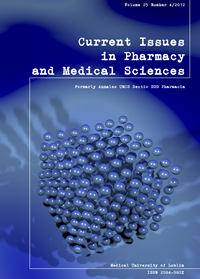Serum adiponectin concentration in patients with type 1 diabetes
DOI:
https://doi.org/10.12923/j.2084-980X/25.4/a.04Keywords:
adiponectin, adipose tissue, diabetes, type 1 diabetes, vascular complicationsAbstract
Adiponectin (AdipoQ) is known as one of the major mediators of adipose tissue metabolism with beneficial effects on carbohydrates and lipids. The effect of low concentrations of adiponectin on the development of obesity, insulin resistance, type 2 diabetes and cardiovascular disease is quite well understood. However, there is still little research available defining the role of adiponectin in the pathogenesis of type 1 diabetes (DM1) and its’ complications. Therefore, it seems appropriate to undertake research aiming to evaluate serum levels of adiponectin in the blood of patients with DM1 and to evaluate the correlations between this adipocytokine concentration and selected clinical data as well as biochemical parameters evaluated in routine diagnosis and monitoring of diabetes. The study included 40 patients aged 41.9±12.7 years, diagnosed with type 1 diabetes and group of healthy controls (n=26) with mean age of 41.2±15.3 years. In serum samples of all patients single-time determination of adiponectin, glucose, total cholesterol, HDL cholesterol, LDL cholesterol, triglycerides, urea, creatinine, glycated hemoglobin levels and alanine aminotransferase and aspartate aminotransferase activity were performed. The mean AdipoQ concentration was significantly higher in the study group than in healthy subjects (16.2±11.7 ug/ml vs. 7.3±2.0 ug/ml; p<0.001). Significantly higher levels of AdipoQ in women than in men with DM1 (23.1±14.0 ug/ml vs. 11.0±5.8 ug/ml; p<0.001) were found. AdipoQ was directly correlated with disease duration (r=0.539, p=0.003) as well as inversely with patients’ body mass (r=-0.423, p=0.025). Observed increased levels of AdipoQ in patients with DM1 with concomitant vascular complications as compared to patients without the complications, however not statistically significant, suggests that this protein may play important role in the pathogenesis of diabetic angiopathy.
References
1. Achenbach P. et al.: Natural history of type 1 diabetes. Diabetes, 54(2), 25, 2005.
2. Arita Y. et al.: Paradoxical decrease of an adipose-specific protein, adiponectin, in obesity. Biochem. Biophys. Res. Commun., 257, 79, 1999.
3. Celi F. et al.: Circulating adipocytokines in non-diabetic and Type 1 diabetic children: relationship to insulin therapy, glycaemic control and pubertal development. Diabet. Med., 23, 660, 2006.
4. Fasshauer M., Klein J., Neumann S.: Hormonal regulation of adiponectin gene expression in 3T3- L1 adipocytes. Biochem. Biophys. Res. Commun., 21, 1045, 2003.
5. Frystyk J. et al.: Increased serum adiponectin levels in type 1 diabetic patients with microvascular complications. Diabetologia, 48(9), 1911, 2005.
6. Galler A. et al.: Elevated serum levels of adiponectin in children and adolescents with type 1 diabetes and the impact of age, gender, BMI and metabolic control: a longitudinal study. Hor. Res., 68 (1), 23, 2007.
7. Gillespie K.M.: Type 1 diabetes: pathogenesis and prevention. CMAJ, 175(2), 165, 2006.
8. Habeeb N.M. et al..: Adiponectin as a Marker of Complications in Type I Diabetes. Indian Pediat, 49, 277, 2012.
9. Hadjadj S. et al.: Increased plasma adiponectin concentrations are associated with microangiopathy in type 1 diabetic subjects. Diabetologia, 48,1088, 2005.
10. Havel P.J.: Update on adipocyte hormones: regulation of energy balance and carbohydrate/lipid metabolism. Diabetes, 53(1), 143, 2004.
11. Hotta K. et al.: Plasma concentrations of a novel, adipose-specific protein, adiponectin, in type 2 diabetic patients. Arterioscler. Thromb. Vasc. Biol., 20, 1595, 2000.
12. Imagawa A. et al.: Elevated serum concentration of adipose-derived factor, adiponectin, in patients with type 1 diabetes. Diabetes Care, 25, 1665, 2002.
13. Kollerits B. et al.: Gender-specific association of adiponectin as a predictor of progression of chronic kidney disease: the Mild to Moderate Kidney Disease Study. Kidney Int., 71(12), 1279, 2007.
14. Leth H. et al.: Elevated Levels of High-Molecular-Weight Adiponectin in Type 1 Diabetes. J. Clin. Endocrinol. Metab., 93(8), 3186, 2008.
15. Lihn A.S., Pedersen S.B., Richelsen B.: Adiponectin: action, regulation and association to insulin sensitivity. Obes Rev, 6(1), 13, 2005.
16. Lindstrom T. et al.: Elevated circulating adiponectin in type 1 diabetes is associated with long diabetes diuration. Clin. Endocrinol., 65, 776, 2006.
17. Martos-Moreno G.A. et al.: Relationship between adiponectin levels, acylated ghrelin levels, and short-term body mass index changes in children with diabetes mellitus type 1 at diagnosis and after insulin therapy. Eur. J. Endocrinol., 155, 757, 2006.
18. Morales A. et al.: Adiponectin and leptin concentrations may aid in discriminating disease forms in children and adolescents with type 1 and type 2 diabetes. Diabetes Care, 27, 2010, 2004.
19. Nishizawa H. et al.: Androgens decrease plasma adiponectin, an insulin-sensitizing adipocyte-derived protein. Diabetes, 51, 2734, 2002.
20. Okamoto Y. et al.: Adiponectin: a key adipocytokine in metabolic syndrome. Clin. Sci., 110(3), 267, 2006.
21. Peczyńska J. et al.: Ocena stężenia adiponektyny u dzieci i młodzieży z cukrzycą typu 1. Endokrynol. Diabetol. Chor. Przemiany Materii Wieku Rozw., 14(2), 77, 2008.
22. Perseghin G. et al.: Insulin resistance, intramyocellular lipid content, and plasma adiponectin in patients with type 1 diabetes. Am. J. Physiol. Endocrinol. Metab., 285, 1174, 2003.
23. Saraheimo M. et al.: Serum adiponectin is increased in type 1 diabetic patients with nephropathy. Diabetes Care, 28, 1410, 2005.
24. Schalkwijk C.G. et al.: Prospective Complications Study Group: Adiponectin is inversely associated with renal function in type 1 diabetic patients. J. Clin. Endocrinol. Metab., 91, 129, 2006.
25. Szadkowska A.: Insulinooporność w cukrzycy typu 1. Rozprawa habilitacyjna. Łódź 2007.
26. Szalecki M. et al.: Rola adiponektyny w cukrzycy typu 1 u dzieci. Wpływ stosowanej metody insulinoterapii. Endokrynol. Ped.,1(30), 21, 2010.
Downloads
Published
Issue
Section
License
Copyright (c) 2012 Authors

This work is licensed under a Creative Commons Attribution-NonCommercial-NoDerivatives 3.0 Unported License.


